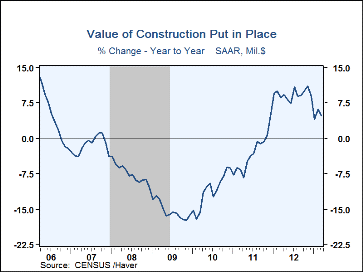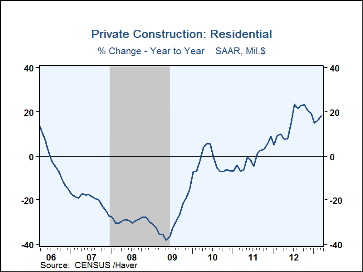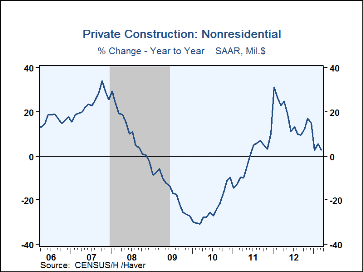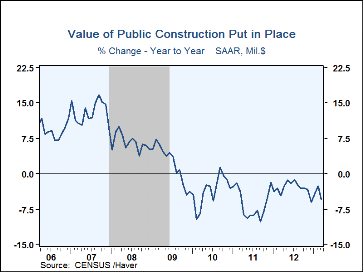 Global| May 01 2013
Global| May 01 2013U.S. Construction Spending Reverses Earlier Rebound
by:Tom Moeller
|in:Economy in Brief
Summary
Reversals and revisions can change the picture of an economic series. Such was the case with the latest construction put in place numbers. Building activity fell 1.7% (+4.8% y/y) in March and reversed a 1.5% February rise. Moreover, [...]
Reversals and revisions can change the picture of an economic series. Such was the case with the latest construction put in place numbers. Building activity fell 1.7% (+4.8% y/y) in March and reversed a 1.5% February rise. Moreover, it added to a 4.0% January decline which was double the last estimated drop. As a result, the level of construction activity was 4.1% lower than at yearend 2012. March activity had been expected to rise 0.6% from February.
Private sector building activity fell 0.6% (+9.8% y/y) in March, pulled lower by a 1.5% decline (+2.8% y/y) in nonresidential construction. Educational spending led the way down with a 3.5% drop (-3.5% y/y) accompanied by a 3.1% shortfall (+1.0% y/y) in commercial construction. A 3.7% rise (-4.1% y/y) in communication spending offset some of this weakness. Residential building also countered these declines with a 0.4% rise (18.2% y/y). New housing construction rose 1.4% (39.6% y/y) but spending on improvements fell a sharp 1.4% (-7.3% y/y), down for the fifth straight month.
The value of public sector building declined 4.1% (-5.4% y/y) and activity was down 20.6% from 2009 high. The latest drop reflected a 10.8% decline (-29.0% y/y) in office, a 6.5% shortfall (+28.6% y/y) in power and a 5.2% drop (-5.0% y/y) in highways and streets. Residential building activity offset some of this with a 13.7% rise (-0.2% y/y).
The construction spending figures are in Haver's USECON database and the expectations figure is contained in the AS1REPNA database.
Tom Moeller
AuthorMore in Author Profile »Prior to joining Haver Analytics in 2000, Mr. Moeller worked as the Economist at Chancellor Capital Management from 1985 to 1999. There, he developed comprehensive economic forecasts and interpreted economic data for equity and fixed income portfolio managers. Also at Chancellor, Mr. Moeller worked as an equity analyst and was responsible for researching and rating companies in the economically sensitive automobile and housing industries for investment in Chancellor’s equity portfolio. Prior to joining Chancellor, Mr. Moeller was an Economist at Citibank from 1979 to 1984. He also analyzed pricing behavior in the metals industry for the Council on Wage and Price Stability in Washington, D.C. In 1999, Mr. Moeller received the award for most accurate forecast from the Forecasters' Club of New York. From 1990 to 1992 he was President of the New York Association for Business Economists. Mr. Moeller earned an M.B.A. in Finance from Fordham University, where he graduated in 1987. He holds a Bachelor of Arts in Economics from George Washington University.










